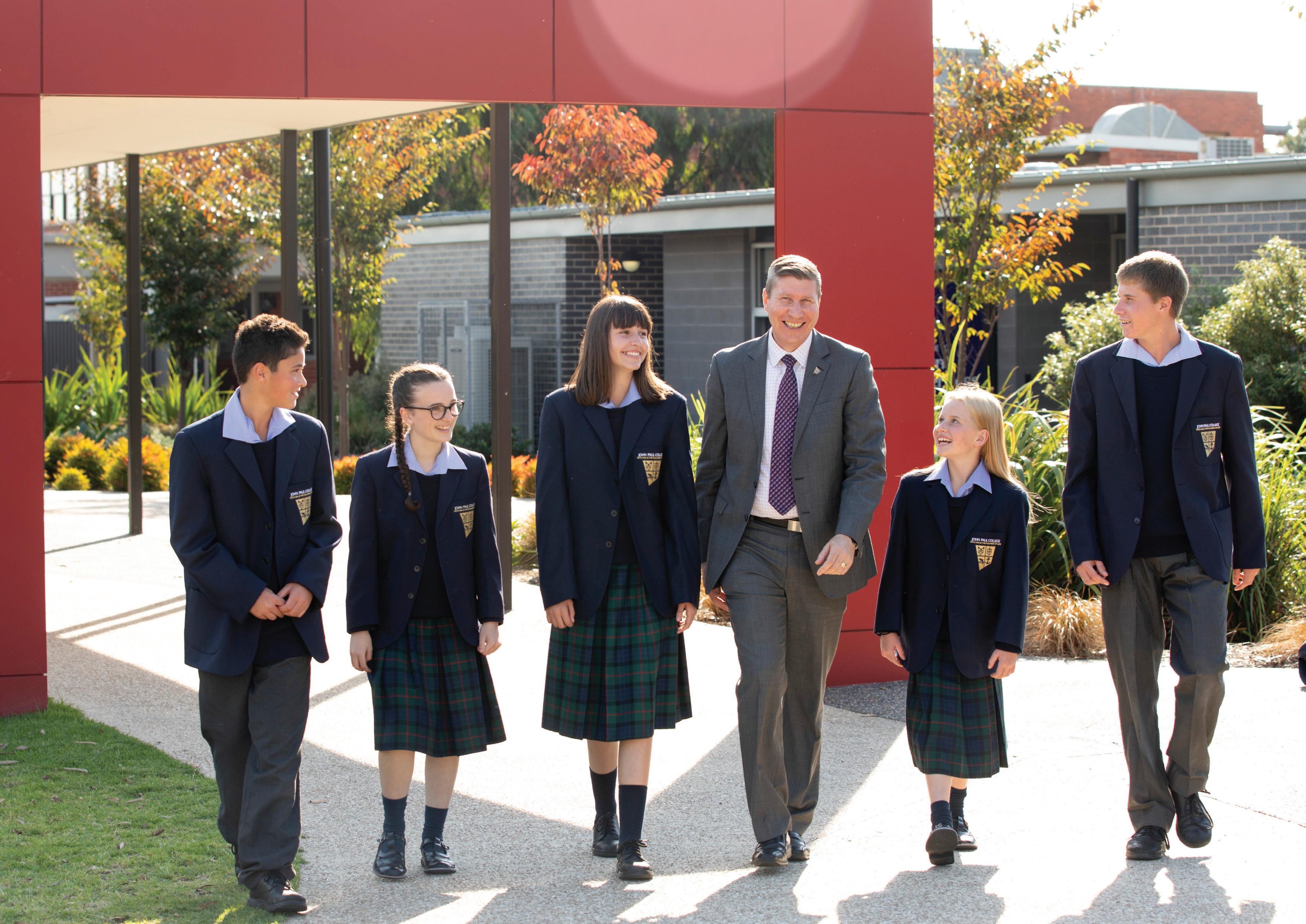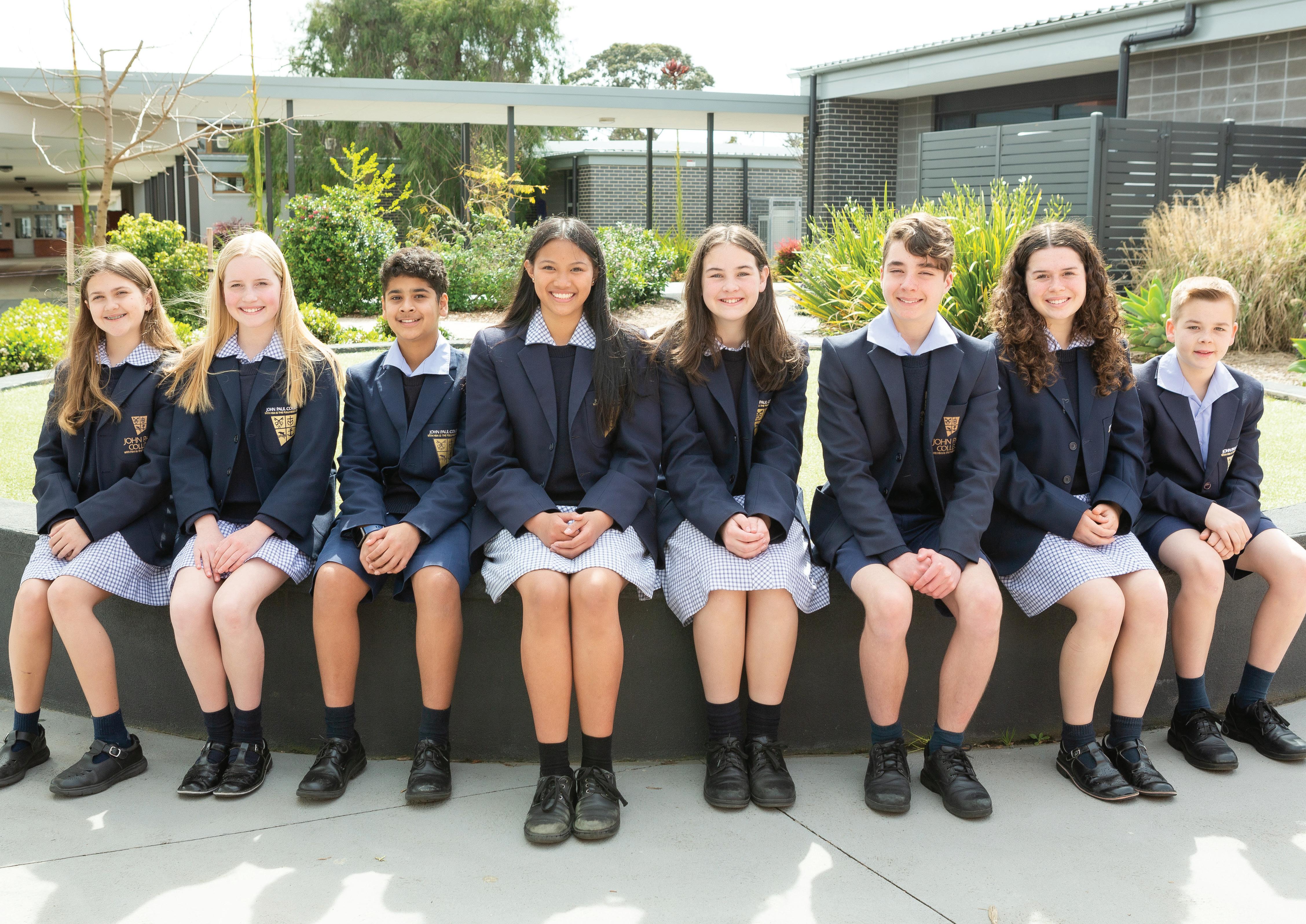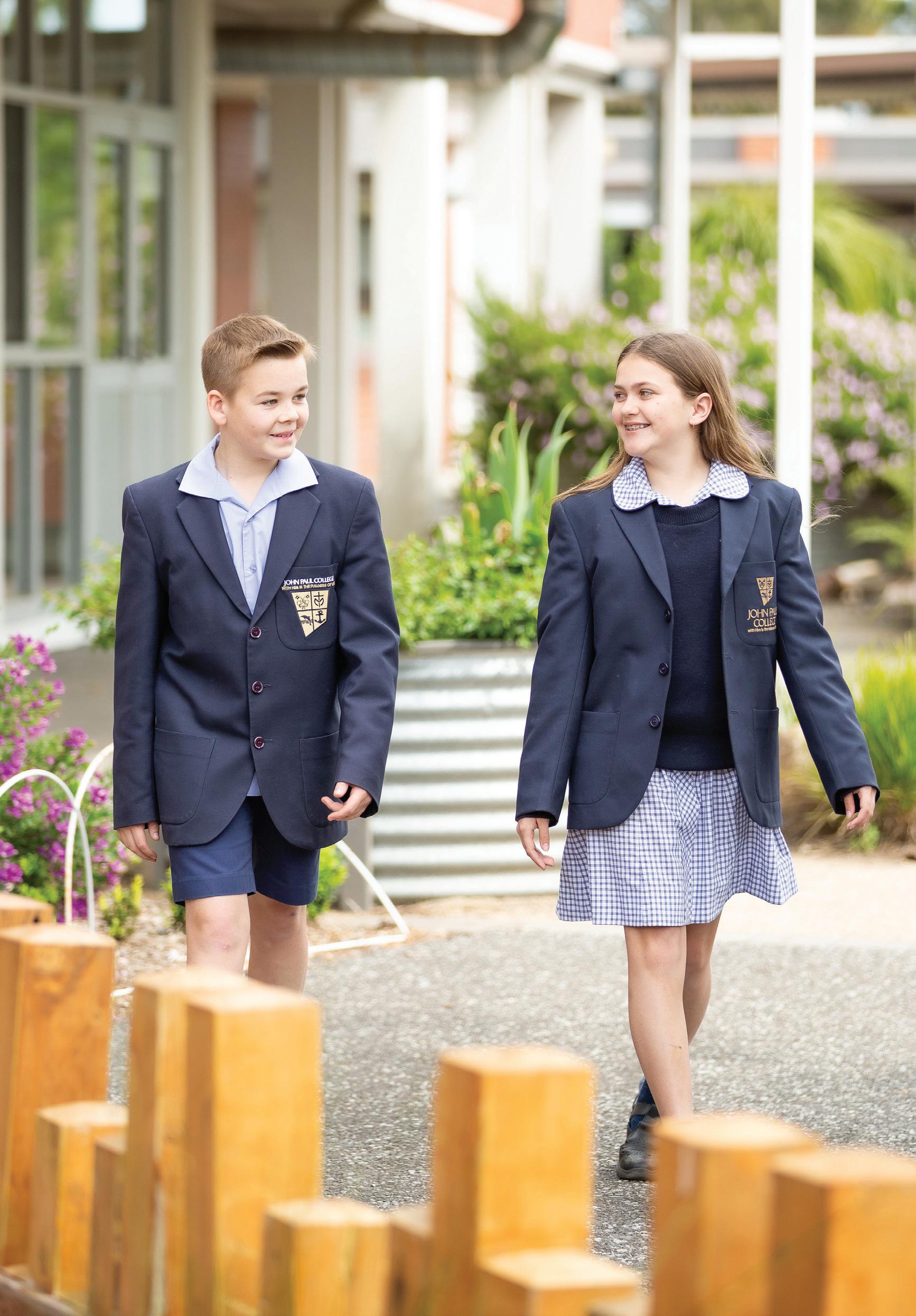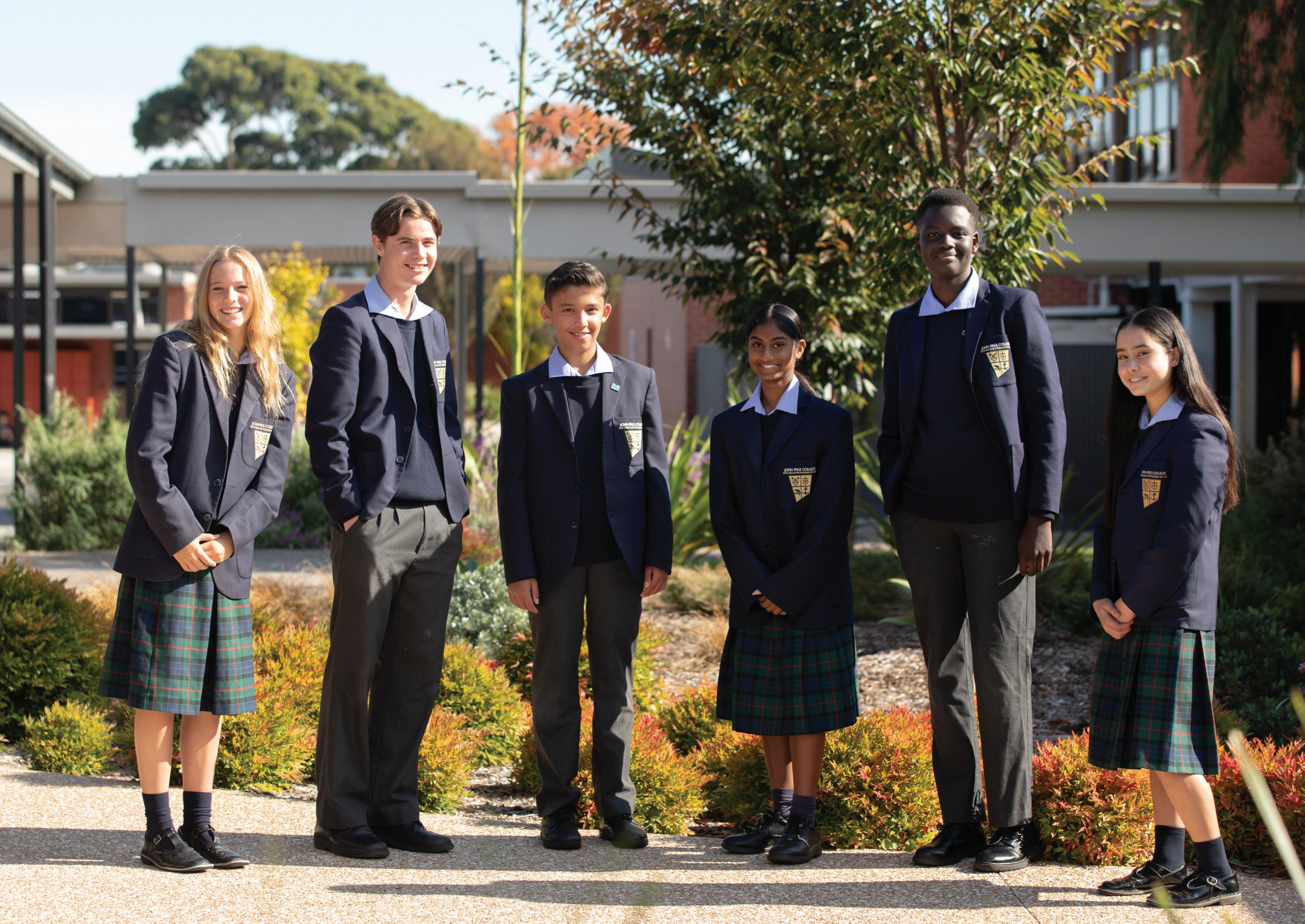Our Strategic Plan
2022 - 2025


2022 - 2025

Inspired by the Gospels’ values, John Paul College provides an exemplary and holistic education within the Catholic tradition. Our community welcomes students and their families from the parishes and communities of the greater Frankston region. We believe every student’s success is grounded in quality learning and teaching, and a school culture that fosters wellbeing, promotes resilience and inspires faith in action.



Jn 10:10
Our motto is our vision – the commitment to ensure every member of our community is empowered to achieve success, act with integrity and contribute to the common good – Christian discipleship for a just world.
We treasure our spirit of community and the values that flow from it – courage, perseverance and generosity. The strength of our House system is anchored in these values and the charism we inherit from the lives of our founders. Today, we live by our values and animate them within a culture that:
• Respects the dignity of every person
• Is inclusive, compassionate, just and forgiving, and
• Honours the integrity of creation through careful stewardship
At John Paul College we believe in the full flourishing of each student in line with our College Mission and Values: “With Him is the fullness of life” (Jn 10:10).
Our mission is to allow each person in this community to see their own worth and find opportunities to live out their own future. In a rapidly changing world, we must ensure that we remain future focussed to enable all to seek opportunities, build capabilities, and develop collaborative relationships.
The College Strategic Plan will guide our work to improve student outcomes through targeted improvement strategies and is intended to be enacted over the four-year period, 2022-2025.
The Strategic Plan was formulated as a response to the data and insights gained through the consultative processes of the College Review in 2021. The College Review provided an opportunity for the College, under the guidance of external reviewers and in line with Melbourne Archdiocese Catholic Schools (MACS) processes, to seek feedback from students, parents/ guardians and staff in the areas of Religious Dimension, Learning and Teaching, Student Wellbeing, Leadership and Management and School Community.

The opportunities for growth outlined in the Strategic Plan are our commitment to ensure that we are offering the highest quality
“Our mission is to allow each person in this community to see their own worth and find opportunities to live out their own future.”
of education and support for our students and always seeking to improve. These are the core drivers that underpin student growth and development, and will be a measure for our success over the period of the plan. The Strategic Plan will be given greater depth and specific targets and practices in our Annual Action Plans.
It is important to note that a plan is only useful if it is communicated,
understood, committed to, and enacted faithfully. This is our stated intent, to involve all in our school community in understanding where we are headed and to commit to work together to ensure that our words are matched by our deeds. The future is exciting, and our Strategic Plan 2022-2025 provides the pathway to success.
JOHN VISENTIN COLLEGE PRINCIPAL
We will embed consistent, purposeful strategies that engage our staff and students in high quality teaching and learning, holistic education and authentic student agency.
 6 JOHN PAUL COLLEGE
6 JOHN PAUL COLLEGE
To increase student reflection on their progress and participation in school decision-making.
To build the capacity of teachers in teaching practice, curriculum documentation and use of data.

To have a shared understanding about the link between individual roles and responsibilities and the College mission, goals and vision.
“It is through the union of students, parents, teachers and friends that we achieve our goal as a Catholic school.”
- M. Dolores, FCJ – 1975

“The goodwill and contribution of each student, each staff member and each family, is needed to ensure that what we began in these early years may become a tradition we can be proud and eager to uphold.”
- Sister Frances, FCJ – 1981
Empower students to reflect on their learning and wellbeing in order to articulate their progress and goals.
Teachers design learning activities that use peer feedback and self-reflection as a regular part of practice to empower students.
Students self-reflect and provide input to school leaders and teachers when planning wellbeing activities and positive behaviours.
Create opportunities to empower and value student participation in school decision-making.
Staff have a deeper understanding of the importance and value of student voice.
Student participatory responses to arising community issues are identified through student voice or student leadership opportunities.
Improve curriculum documentation which is consistently applied.
Curriculum planning is sequential from Years 7 to 12.
Seek student feedback in the building of Curriculum documentation to maximise student engagement in learning.
Teachers to communicate learning intentions and success criteria to students.
Build the capacity of teachers to understand and implement a range of pedagogical practices.
Teachers work collaboratively to share and demonstrate best practice to improve student learning.
Develop the system and tools for teachers to access, interpret and respond to student data in their teaching.
Teachers to use data to assess student progress and adjust teaching practices and give student feedback.
Teachers collaborate to interpret individual and cohort data to improve student outcomes.
To use data to ensure moderation processes are consistent in subjects and year levels.


“No doubt, faith must be animated by charity. Faith should not only be a light in the mind, but it should be in the heart as well. There must be in faith a disposition of the heart; love of truth.”
- Bl. William Joseph Chaminade
Establish a shared understanding about the link between individual roles and responsibilities and our mission, goals and vision.
Embed practices which are visible, co-constructed and comprehensively aligned to Catholic Tradition and a whole-school approach to mission.
Implement structures and processes which provide clarity and a shared understanding of purpose.
Develop an organisational structure that is led collaboratively by the leadership team and governing body and promotes the delegation of responsibilities across the school to key personnel.
Policies, processes and practices allow for efficient communication in learning and teaching and wellbeing.
 - Bro Donald
- Bro Donald
Neff – 1981
“A good school results from caring, dedicated staff, parents and involved and enthusiastic students working together for what the school is all about, the growth of all involved.”
